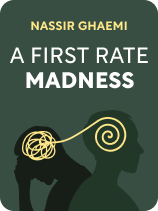

This article is an excerpt from the Shortform book guide to "A First Rate Madness" by Nassir Ghaemi. Shortform has the world's best summaries and analyses of books you should be reading.
Like this article? Sign up for a free trial here.
Is poor decision-making a result of mental illness? Why is good mental health bad during a crisis?
You may think we got it backward, but we didn’t—mental illness can be good to have during a bad situation, and good mental health is not. That is, at least for influential leaders who are under a lot of pressure.
Find out why poor decision-making, mental illness, and crises aren’t all directly connected.
When Good Mental Health Can Be Bad
According to Nassir Ghaemi’s book A First-Rate Madness, mentally healthy leaders often make bad decisions during crises—they tend to be overly optimistic, less empathetic, unchallenged by struggles, and inflexible when compared to leaders who had a mentally illness. Poor decision-making, he argues, is the result of good mental health. While such leaders can be effective during peacetime, they often lack the right instincts during times of conflict. To make his point, he examines how mental health negatively affected the leadership of Neville Chamberlain, George McClellan, George W. Bush, and Tony Blair.
| Emotions, Memory, and Decision-Making During Crises Ghaemi describes several reasons why mentally healthy people make bad decisions in crises. However, everyone, regardless of their mental health, can fall prey to poor decision-making because of how our brains use memory to make those decisions. Experts explain that, when making decisions, our brains look for patterns when we assess situations, and we often react to those patterns based on our memories or past experiences. These reactions can be misleading because our memories have emotional tags—emotions that are attached to a memory, such as the joy of success or the distress of failure. Even the most perceptive leader can’t always tell when they’re being influenced by these emotions, which can cause them to overlook certain factors while focusing on others. For this reason, experts believe that group decision-making is the best practice for making crucial decisions. |
Ghaemi argues that the reason Neville Chamberlain, the prime minister preceding Winston Churchill, was unable to accurately assess the threat Hitler posed to the world was that Chamberlain was too mentally stable. Unlike Churchill, Chamberlain took a more conciliatory approach to the Nazi threat. Ghaemi argues that Chamberlain’s mental health prevented him from understanding the reality of the situation—that appeasement wouldn’t be an effective solution. Instead, the Prime Minister was overly optimistic, dismissed the German dictator’s belligerent intentions, and believed that war could be avoided through negotiation.
(Shortform note: In 1938, during Neville Chamberlain’s three-year term as prime minister, Hitler had already annexed Austria and set his eyes upon Sudetenland, a German-speaking region of Czechoslovakia. In September, Chamberlain met with the German dictator and signed the Munich Agreement, granting him Sudetenland so that he wouldn’t invade Czechoslovakia. When Chamberlain returned, he announced the success of the agreement in a speech: “I believe it is peace for our time.” This statement, Ghaemi might argue, reflects his optimistic and unrealistic view of the situation, for in a matter of months, Hitler would take over the rest of Czechoslovakia and march into Poland.)
Similarly, Ghaemi argues that the sound mental health of General George B. McClellan, another Union commander during the Civil War, contributed to his military failures. Unlike with General Sherman, Ghaemi found no evidence that General McClellan suffered from any mental illnesses, and this prevented him from having bold, creative insights. McClellan consistently misjudged his enemies and limited himself to the traditional strategies he’d learned at West Point. His good mental health limited his ability to think outside the box and made him inflexible.
| Did General McClellan Have a Messiah Complex? Historians propose an additional factor that might have contributed to General McClellan’s military failures: He suffered from an inflated ego. He believed he was chosen by divine providence to be the savior of the Union and reveled in his nickname “Young Napoleon.” However, while he confidently organized and trained his men for long periods of time, he consistently hesitated when it came time for battle, overestimated the size of enemy forces, and withheld his troops. Some historians have suggested that McClellan did have some form of psychological abnormality, namely a “messiah complex,” which is sometimes associated with bipolar disorder. Others, however, maintain that McClellan’s belief that he was chosen by God to perform his work was normal for a time when religion played a big part in people’s lives. On the whole, this debate reinforces the notion that mental health is on a spectrum yet also suggests that not all traits of mental illnesses are beneficial to leadership, such as the grandiosity some may experience with bipolar disorder. |
Finally, Ghaemi examines the leadership of George W. Bush and Tony Blair during the September 11 attacks in 2001, arguing that neither leader possessed the understanding or flexibility to properly handle the situation. Based on a review of their pasts, Ghaemi determines both Bush and Blair to be mentally healthy. He argues that both failed to approach the conflict with a nuanced perspective and decided to use military power to invade Iraq, a controversial decision that many have criticized.
(Shortform note: Historian Melvyn P. Leffler offers deeper insights into the driving forces behind Bush’s decision to invade Iraq. He argues that three factors drove Bush’s decision: fear, power, and hubris. Leffler contends that Bush feared another attack and wanted to demonstrate the power of the US military. When no weapons of mass destruction were found, Bush shifted his focus to bringing democracy to Iraq, believing that everyone wanted to live by American values. This inflexibility, Ghaemi might argue, is a classic sign of Bush’s hubris syndrome.)

———End of Preview———
Like what you just read? Read the rest of the world's best book summary and analysis of Nassir Ghaemi's "A First Rate Madness" at Shortform.
Here's what you'll find in our full A First Rate Madness summary:
- How mental illness can make someone a better leader
- How leaders like Churchill and Roosevelt benefited from mental illness
- The pitfalls of being a mentally well leader during a time of crisis






